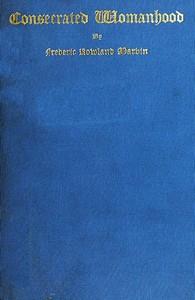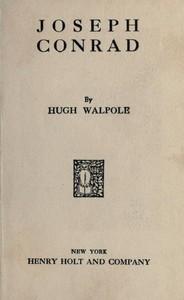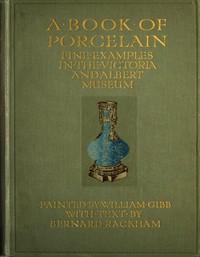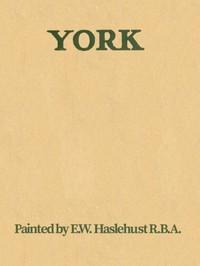Read this ebook for free! No credit card needed, absolutely nothing to pay.
Words: 27539 in 8 pages
This is an ebook sharing website. You can read the uploaded ebooks for free here. No credit cards needed, nothing to pay. If you want to own a digital copy of the ebook, or want to read offline with your favorite ebook-reader, then you can choose to buy and download the ebook.
A Short Bibliography American Bibliography Index
BIOGRAPHY
To any reader of the books of Joseph Conrad it must be at once plain that his immediate experiences and impressions of life have gone very directly to the making of his art. It may happen often enough that an author's artistic life is of no importance to the critic and that his dealing with it is merely a personal impertinence and curiosity, but with the life of Joseph Conrad the critic has something to do, because, again and again, this writer deliberately evokes the power of personal reminiscence, charging it with the burden of his philosophy and the creation of his characters.
With the details of his life we cannot, in any way, be concerned, but with the three backgrounds against whose form and colour his art has been placed we have some compulsory connection.
Joseph Conrad was born on 6th December 1857, and his birthplace was the Ukraine in the south of Poland. In 1862 his father, who had been concerned in the last Polish rebellion, was banished to Vologda. The boy lived with his mother and father there until his mother died, when he was sent back to the Ukraine. In 1870 his father died.
Looking for an instant at the dramatic contrast and almost ironical relationship of these three backgrounds--Poland, the Sea, the inner security and tradition of an English country-side--one can realise what they may make of an artist. That early Polish atmosphere, viewed through all the deep light and high shade of a remembered childhood, may be enough to give life and vigour to any poet's temperament. The romantic melancholy born of early years in such an atmosphere might well plant deeply in any soul the ironic contemplation of an impossible freedom.
Growing into youth in a land whose farthest bounds were held by unlawful tyranny, Conrad may well have contemplated the sea as the one unlimited monarchy of freedom and, even although he were too young to realise what impulses those were that drove him, he may have felt that space and size and the force of a power stronger than man were the only conditions of possible liberty. He sought those conditions, found them and clung to them; he found, too, an ironic pity for men who could still live slaves and prisoners to other men when to them also such freedom was possible. That ironic pity he never afterwards lost, and the romance that was in him received a mighty impulse from that contrast that he was always now to contemplate. He discovered the Sea and paid to her at once his debt of gratitude and obedience. He thought it no hard thing to obey her when he might, at the same time, so honestly admire her and she has remained for him, as an artist, the only personality that he has been able wholeheartedly to admire. He found in her something stronger than man and he must have triumphed in the contemplation of the dominion that she could exercise, if she would, over the tyrannies that he had known in his childhood.
He found, too, in her service, the type of man who, most strongly, appealed to him. He had known a world composed of threats, fugitive rebellions, wild outbursts of defiance, inefficient struggles against tyranny. He was in the company now of those who realised so completely the relationship of themselves and their duty to their master and their service that there was simply nothing to be said about it. England had, perhaps, long ago called to him with her promise of freedom, and now on an English ship he realised the practice and performance of that freedom, indulged in, as it was, with the fewest possible words. Moreover, with his fund of romantic imagination, he must have been pleased by the contrast of his present company, men who, by sheer lack of imagination, ruled and served the most imaginative force in nature. The wonders of the sea, by day and by night, were unnoticed by his companions, and he admired their lack of vision. Too much vision had driven his country under the heel of Tyranny, had bred in himself a despair of any possible freedom for far-seeing men; now he was a citizen of a world where freedom reigned because men could not perceive how it could be otherwise; the two sides of the shield were revealed to him.
The quiet atmosphere of the England that he had adopted made the final, almost inevitable contrast with the earlier periods. With such a country behind him it was possible for him to contemplate in peace the whole "case" of his earlier life. It was as a "case" that he saw it, a "case" that was to produce all those other "cases" that were his books. This has been their history.
In the north-east corner lies a spur from the Continental Divide, the Mummy Range, a tumbled majestic mountain mass which includes some of the loftiest peaks and one of the finest glaciers.
To the south of Longs Peak the country grows even wilder. The range is a succession of superb peaks. The southern park boundary unfortunately cuts arbitrarily through a superlative massing of noble snow-covered summits.
The west side, gentler in its slopes and less majestic in its mountain massings, is a region of loveliness and wildness diversified by splendid mountains, innumerable streams and lakes of great charm. Grand Lake, which has railroad connections nearby, is one of the largest natural lakes in Colorado and the deepest lake in this region.
Free books android app tbrJar TBR JAR Read Free books online gutenberg
More posts by @FreeBooks
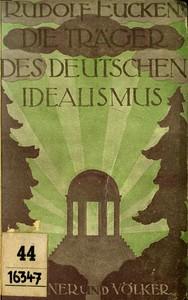

: Consecrated Womanhood A Sermon Preached in the First Congregational Church Portland Oregon by Marvin Frederic Rowland Cobbe Frances Power Author Of Introduction Etc - Sermons American; Women in the Bible; Women Biblical teaching
